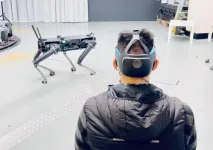(Press-News.org) It sounds like something from science fiction: Don a specialized, electronic headband and control a robot using your mind. But now, recent research published in ACS Applied Nano Materials has taken a step toward making this a reality. By designing a special, 3D-patterned structure that doesn’t rely on sticky conductive gels, the team has created “dry” sensors that can measure the brain’s electrical activity, even amidst hair and the bumps and curves of the head.
Physicians monitor electrical signals from the brain with electroencephalography (EEG), in which specialized electrodes are either implanted into or placed on the surface of the head. EEG helps diagnose neurological disorders, but it can also be incorporated into “brain-machine interfaces,” which use brain waves to control an external device, such as a prosthetic limb, robot or even a video game. Most non-invasive versions involve the use of “wet” sensors, which are stuck onto the head with a gloopy gel that can irritate the scalp and sometimes trigger allergic reactions. As an alternative, researchers have been developing “dry” sensors that don’t require gels, but thus far none have worked as well as the gold-standard wet variety. Although nanomaterials like graphene could be a suitable option, their flat and typically flaky nature make them incompatible with the uneven curves of the human head, particularly over long periods. So, Francesca Iacopi and colleagues wanted to create a 3D, graphene-based sensor based on polycrystalline graphene that could accurately monitor brain activity without any stickiness.
The team created several 3D graphene-coated structures with different shapes and patterns, each around 10 µm thick. Of the shapes tested, a hexagonal pattern worked the best on the curvy, hairy surface of the occipital region — the spot at the base of the head where the brain’s visual cortex is located. The team incorporated eight of these sensors into an elastic headband, which held them against the back of the head. When combined with an augmented reality headset displaying visual cues, the electrodes could detect which cue was being viewed, then work with a computer to interpret the signals into commands that controlled the motion of a four-legged robot — completely hands-free. Though the new electrodes didn’t yet work quite as well as the wet sensors, the researchers say that this work represents a first step toward developing robust, easily implemented dry sensors to help expand the applications of brain-machine interfaces.
The authors acknowledge funding from the Defence Innovation Hub of the Australian Government and support from the Australian National Fabrication Facility of the University of Technology Sydney and the Research & Prototype Foundry at the University of Sydney Nano Institute.
The American Chemical Society (ACS) is a nonprofit organization chartered by the U.S. Congress. ACS’ mission is to advance the broader chemistry enterprise and its practitioners for the benefit of Earth and all its people. The Society is a global leader in promoting excellence in science education and providing access to chemistry-related information and research through its multiple research solutions, peer-reviewed journals, scientific conferences, eBooks and weekly news periodical Chemical & Engineering News. ACS journals are among the most cited, most trusted and most read within the scientific literature; however, ACS itself does not conduct chemical research. As a leader in scientific information solutions, its CAS division partners with global innovators to accelerate breakthroughs by curating, connecting and analyzing the world’s scientific knowledge. ACS’ main offices are in Washington, D.C., and Columbus, Ohio.
To automatically receive news releases from the American Chemical Society, contact newsroom@acs.org.
Follow us: Twitter | Facebook | LinkedIn | Instagram
END
A sensor that might someday enable ‘mind-controlled’ robots
2023-04-03
ELSE PRESS RELEASES FROM THIS DATE:
Older adults perceive artificial intelligence as more human-like than younger adults do
2023-04-03
Older adults perceive artificial intelligence as more human-like than younger adults do
Toronto, April 3, 2023 – Artificial intelligence (AI) is increasingly present in all of our lives, from newer offerings like ChatGPT to more established voice systems such as automated phone services, self-checkouts, Apple’s Siri and Amazon’s Alexa. While these technologies largely benefit us, they can also be used in adverse ways – for instance, in fraudulent or scam calls – making it important for us to be able to identify them.
According to a recent Baycrest study, older adults appear to be less able to distinguish ...
E-health reduces patient pain, opioids in clinical study
2023-04-03
SPOKANE, Wash. – An online “e-health” program helped more people with chronic pain reduce their opioid medications and pain intensity than a control group that had only regular treatment in a recent clinical study.
In the study published in the journal Pain, about 400 participants who had been prescribed long-term opioid treatment for their pain were divided into two groups: one received treatment as usual and another received treatment and access to a self-guided, e-health program. Of the e-health group, more than half, 53.6%, were able to reduce their ...
Purified curcumin instead of artificial additives can be used to preserve and enhance probiotic yogurt
2023-04-03
Researchers have succeeded for the first time in adding a highly purified form of curcumin to yogurt in a way that ensures it remains dissolved in the dairy product and preserves it, while tasting good.
Their discovery, which is published today (Monday) in Frontiers in Nutrition, makes it possible to create a probiotic yogurt that contains no artificial preservatives but that still has a long shelf life and properties that may enhance good health.
Curcumin is a naturally-occurring chemical that provides the yellow colour in turmeric. Studies have shown that it has anti-inflammatory and anti-oxidative properties, that it can inhibit the growth ...
English language pushes everyone – even AI chatbots - to improve by adding
2023-04-03
A linguistic bias in the English language that leads us to ‘improve’ things by adding to them, rather than taking away, is so common that it is even ingrained in AI chatbots, a new study reveals.
Language related to the concept of ‘improvement’ is more closely aligned with addition, rather than subtraction. This can lead us to make decisions which can overcomplicate things we are trying to make better.
The study is published today (Monday 3rd April) in Cognitive Science, by an international ...
Privately sponsored refugees likely to receive better prenatal care than government-assisted refugees in Canada
2023-04-03
Government-assisted refugees were less likely to receive adequate prenatal care than privately sponsored refugees, found a new study published in CMAJ (Canadian Medical Association Journal) https://www.cmaj.ca/lookup/doi/10.1503/cmaj.221207.
Canada has 2 main pathways to resettle refugees: government assistance and private sponsorship by family members or non-family volunteers.
To determine whether refugees receive adequate prenatal care (defined as initiation of prenatal care by 13 weeks' gestation; receipt of a minimum number of prenatal care visits, as recommended by the Society of Obstetricians and Gynaecologists of Canada; and receipt of a prenatal fetal anatomy ultrasound ...
Taylor & Francis to pilot first transparent peer review model for a higher education research journal
2023-04-03
The quality and integrity of peer review in Higher Education research has been put firmly in the spotlight by the European Journal of Higher Education (EJHE), published by Taylor & Francis. All articles submitted from April 2023 will, if accepted, have their reviewer reports published at the same time, as part of a one-year pilot.
The EJHE peer review process itself will remain the same, with reports on manuscripts under consideration received from two or three referees before an editorial decision is made. ...
Virginia Tech researcher identifies narrow opportunity to address a rare disease linked to autism, schizophrenia
2023-04-03
The human brain begins to assemble itself shortly after conception as a growing number of brain cells connect to create circuits across the brain.
Genes provide the blueprint for construction, but occasionally the blueprint is incomplete, connections aren’t made, and circuits fail — sometimes long before the problem can be recognized, let alone fixed.
That’s the case with DiGeorge syndrome, also called 22q11.2 deletion syndrome, a genetic disorder affecting about one in 3,000 babies. It begins with a deletion of one of two copies of a small number of genes on human chromosome 22, whose cascading effects include cardiovascular problems, craniofacial ...
Polyamorous relationships can have as many benefits as monogamous ones, shows research
2023-04-03
Polyamorists face stigma and discrimination in their day-to-day lives, yet research shows that having a romantic relationship with more than one person at a time may offer emotional and physical benefits to all parties.
Monogamy is frequently portrayed as the ideal form of romantic love in many modern societies. From the stories we read as children, to the films and books we consume as adults – we are told that to achieve happiness we need to find our one true soulmate to share the rest of our lives with.
At the same time, states and governments offer financial, legal, and social incentives to married couples. Meanwhile men and women who deviate from these monogamous ...
Aston University establishes new independent investment company
2023-04-02
Aston University is one of eight research intensive universities in the Midlands to establish a new investment company to accelerate the commercialisation of university spinouts and early-stage IP rich businesses in the region.
Midlands Mindforge Limited has been co-founded by Aston University, University of Birmingham, Cranfield University, Keele University, University of Leicester, Loughborough University, University of Nottingham and University of Warwick, collectively Midlands Innovation.
This ambitious, patient capital ...
Outbreak of typhoid on Dutch ship traced to contaminated drinking water
2023-04-02
**Note: the release below is a special early release from the European Congress of Clinical Microbiology & Infectious Diseases (ECCMID 2023, Copenhagen, 15-18 April). Please credit the conference if you use this story**
Embargo: 2301H UK time Saturday 1 April
A large outbreak of typhoid on a ship in the Netherlands has been traced to contaminated water, this year's European Congress of Clinical Microbiology & Infectious Diseases (ECCMID 2023, Copenhagen, 15-18 April) will hear.
Seventy-two cases of typhoid were confirmed in the spring 2022 outbreak on the Liberty Ann, an old cruise ship which was being ...

